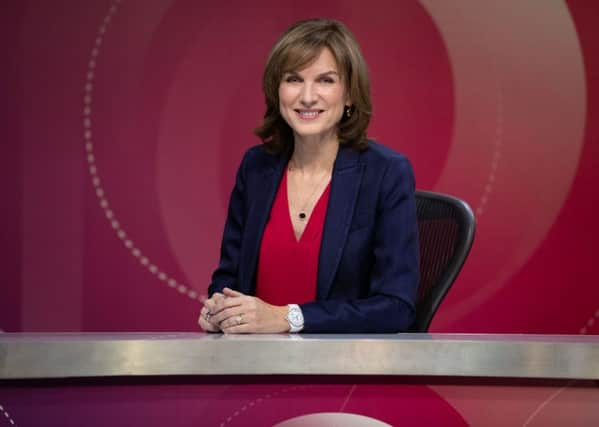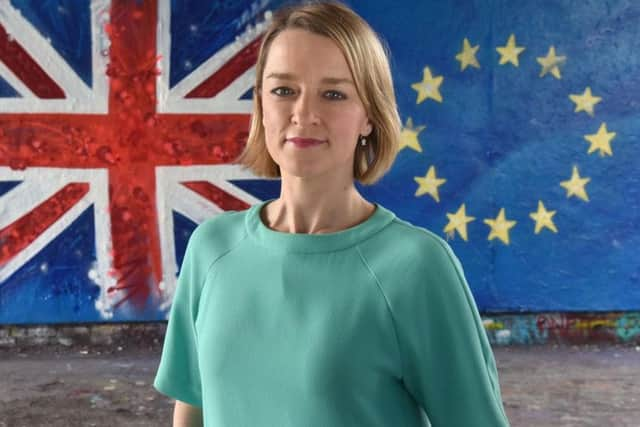Question Time and BBC needs an answer to second-rate politicians, an out of depth Fiona Bruce and rude audience – Tony Rossiter


It didn’t used to be like this. Question Time used to provide an hour of entertaining topical debate by politicians who knew what they were talking about. For a Whitehall civil servant who occasionally dealt with some of the issues discussed, it was often compulsive viewing. But there has been a gradual dumbing down.
Advertisement
Hide AdAdvertisement
Hide AdNow we have second-rate politicians, a presenter who seems out of her depth, and an audience that may shout down views with which it disagrees.


The main problem is the B-list calibre of the panellists, many of whom seem programmed to trot out a pre-scripted party line rather than to engage in real debate. That’s not entirely the BBC’s fault. Obliged to include at least one Government and one Opposition representative, their hands are to some extent tied.
I can’t remember a time when both Government and Opposition front benches were so clueless (most of the talent, on both sides of the House, is now on the back benches). QT panellists used to be politicians of real stature – Denis Healey, Michael Heseltine, Chris Patten, Shirley Williams (just a few names that come to mind). Now we have… well, there are so many incompetents and charlatans to choose from. I’ll resist the temptation.
Advertisement
Hide AdAdvertisement
Hide AdIf the BBC can do little about the calibre of politicians on Question Time, they could at least do something about the other panel member(s) – journalists and broadcasters, business people, comedians and other so-called celebrities. Their contributions are very patchy. Too many of them raise the temperature, but not the quality, of the debate; and a few just lack the knowledge or the articulateness to make an intelligent contribution.
Juergen Maier, chief executive of Siemens UK, stood out in a recent episode by virtue of his clarity, sharpness and courtesy. QT would be better if it reverted to four panellists, as it had in its early days.
Since the EU referendum, the BBC has come under fire from both Remainers and Leavers for the composition of its QT panels. On the whole it has struck a reasonable balance. But why did it give Nigel Farage – and no other candidate – a QT platform just two weeks before the European Parliamentary election?
Question Time is the BBC’s flagship political debate programme; it deserves a heavyweight presenter. The BBC is hardly short of experienced political journalists: Nick Robinson, Laura Kuenssberg, Emily Maitlis, Nick Watt, Kirsty Wark, Andrew Marr, Huw Edwards, Clive Myrie, Andrew Neil, Mark Mardell, Martha Kearney. Take your pick.
Advertisement
Hide AdAdvertisement
Hide AdI’m not convinced that Fiona Bruce was the right choice. I have become increasingly irritated with her inappropriate and often mumbled interruptions.
Of course, an important part of the job is to clarify and challenge the panellists’ comments. But constant interruptions before the speaker has completed a point just do not help.
Many of the questions and comments of QT audiences reinforce entrenched positions rather than contribute to a genuine debate.
On the other hand, some of the programme’s most memorable recent moments have come from perceptive questions or comments from the audience. Occasionally a member of the audience has skewered a panellist with a simple question, as when Farage was asked: ‘Name me one country within the WTO rules that doesn’t have a trade agreement with another country.’ He failed to answer. Hardly surprising: there isn’t one.
Advertisement
Hide AdAdvertisement
Hide AdThe best contributions have often come from members of the audience with personal, first-hand experience of the topic under discussion. A woman running a chemical company in Aylesbury spoke eloquently about the adverse effect Brexit is already having on her business. A GP in Northampton pointed out that retention of qualified doctors is an even bigger problem than recruitment. These are the kind of informed interventions the presenter should seek out.
The audience need to be engaged and given the opportunity to ask questions, but not encouraged to incessantly intrude in the debate. The large number of interventions that are now invited, often before all the panellists have had an opportunity to speak, does nothing to promote civilised debate; on the contrary, comments that are irrelevant or misconceived (as some inevitably are) shed no light on the topic and actually detract from the debate.
Never have we been more in need of intelligent, well-informed debate on the most important topics of the day. If it is to regain the pre-eminent position it once held, Question Time needs to raise its game.
Tony Rossiter is a former diplomat from North Yorkshire.